World Tourism Day: Sector Pledges to Promote Investment, Education and New Destinations
The legacy of the World Tourism Day 2023 celebrations will live on in the shape of greater investments in the sector's sustainability and a shared commitment to spread the benefits the sector delivers even more widely.

Hosted in Riyadh, Saudi Arabia, the official celebrations welcomed more than 50 Ministers of Tourism alongside hundreds of high-level delegates from the public and private sectors. The day featured expert-led panels focused on key topics around this year's theme of Tourism and Green Investments, with plans backed up with concrete actions as UNWTO announced several important new initiatives.
This year has been the biggest World Tourism Day ever, and we want to make sure it leaves the biggest impact too
This year has been the biggest World Tourism Day ever, and we want to make sure it leaves the biggest impact too. From Riyadh, we have joined our global sector around a pledge to promote new destinations, to diversify the economic and social benefits of tourism, and have announced a new school that will transform tourism education in the Middle East. UNWTO Secretary-General Zurab Pololikashvili
Tourism Pledges to Open Minds
In Riyadh, Secretary-General Pololikashvili introduced "Tourism Opens Minds", a landmark initiative designed to showcase the powerful role that tourism plays in bridging cultures and fostering peace and understanding. With UNWTO's latest data indicating the sector is well on track to recover as much as 95% of pre-pandemic arrivals numbers by the end of 2023, Tourism Opens Minds is designed to ensure that this strong recovery is joined by a greater emphasis on tourists exploring less-visited destinations. The focus will be on:
- Making lesser-known destinations more accessible to all tourists and ensuring all visitors receive a warm welcome by host communities
- Promoting lesser-known destinations and actively working to make tourists visit them
- Working with governments and the private sector to encourage tourists themselves to be more open-minded in their choice of travel destination
To mark the launch, UNWTO unveiled a new symbol for the initiative, made up of the colours of the various flags of the world, and shared a pledge for the sector to unite around. A special pledge, to be supported by Governments, private sector leaders and tourists themselves, was shared with select delegates, calling on them to commit to promoting new and diverse travel destinations.
Investing in Tourism Education
To ensure that the World Tourism Day 2023 celebrations leave a lasting impact in Riyadh and across the wider region, UNWTO Secretary-General Pololikashvili joined with Saudi Arabia's Minister of Tourism Ahmed Al-Khateeb to announce a joint project focused on creating new generations of skilled tourism workers:
- The Riyadh School of Tourism and Hospitality will be a collaborative effort between UNWTO, the Ministry of Tourism of Saudi Arabia and Qiddiya
- With 80% of all global tourism education programs currently focused on hotel operations, the Riyadh School will deliver learning for every part of the diverse sector.
- The School will offer eight different levels of educational programs including diplomas and certificates through to professional courses and courses at the Bachelors and Master's degree level.
RELATED LINKS
About UN Tourism
The World Tourism Organization (UN Tourism) is the United Nations agency responsible for the promotion of responsible, sustainable and universally accessible tourism.
As the leading international organization in the field of tourism, UN Tourism promotes tourism as a driver of economic growth, inclusive development and environmental sustainability and offers leadership and support to the sector in advancing knowledge and tourism policies worldwide.
Our Priorities
Mainstreaming tourism in the global agenda: Advocating the value of tourism as a driver of socio-economic growth and development, its inclusion as a priority in national and international policies and the need to create a level playing field for the sector to develop and prosper.
Promoting sustainable tourism development: Supporting sustainable tourism policies and practices: policies which make optimal use of environmental resources, respect the socio-cultural authenticity of host communities and provide socio-economic benefits for all.
Fostering knowledge, education and capacity building: Supporting countries to assess and address their needs in education and training, as well as providing networks for knowledge creation and exchange.
Improving tourism competitiveness: Improving UN Tourism Members' competitiveness through knowledge creation and exchange, human resources development and the promotion of excellence in areas such as policy planning, statistics and market trends, sustainable tourism development, marketing and promotion, product development and risk and crisis management.
Advancing tourism's contribution to poverty reduction and development: Maximizing the contribution of tourism to poverty reduction and achieving the SDGs by making tourism work as a tool for development and promoting the inclusion of tourism in the development agenda.
Building partnerships: Engaging with the private sector, regional and local tourism organizations, academia and research institutions, civil society and the UN system to build a more sustainable, responsible and competitive tourism sector.
Our Structure
Members: An intergovernmental organization, UN Tourism has 160 Member States, 6 Associate Members, 2 Observers and over 500 Affiliate Members.
Organs: The General Assembly is the supreme organ of the Organization. The Executive Council take all measures, in consultation with the Secretary-General, for the implementation of the decisions and recommendations of the General Assembly and reports to the Assembly.
Secretariat: UN Tourism headquarters are based in Madrid, Spain. The Secretariat is led by the Secretary-General and organized into departments covering issues such as sustainability, education, tourism trends and marketing, sustainable development, statistics and the Tourism Satellite Account (TSA), destination management, ethics and risk and crisis management. The Technical Cooperation and Silk Road Department carries out development projects in over 100 countries worldwide, while the Regional Departments for Africa, the Americas, Asia and the Pacific, Europe and the Middle East serve as the link between UN Tourism and its 160 Member States. The Affiliate Members Department represents UN Tourism's 500 plus Affiliate members.
